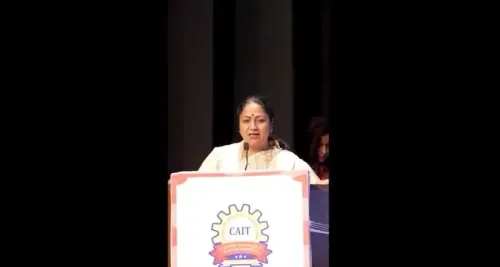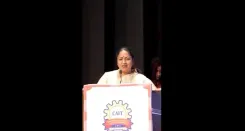India Unveils International Quantum Technology Engagement Strategy

Synopsis
Key Takeaways
- Launch of ITES-Q marks a new approach in Quantum Science.
- Focus on strategic autonomy in Quantum Technology.
- Investment in Quantum hardware is crucial for independence.
- Global standards in Quantum Tech are necessary for strategic positioning.
- NQM encompasses the complete lifecycle of Quantum technology.
New Delhi, April 14 (NationPress) The Office of the Principal Scientific Adviser (PSA) to the Government of India has introduced the inaugural edition of the International Technology Engagement Strategy for Quantum on Monday, representing a crucial milestone in outlining India’s outward-oriented approach to Quantum Science, Technology, and Innovation (QSTI). This strategy aims to expedite discovery, promote innovation, and enhance adoption across pivotal sectors.
The report was officially launched by PSA Prof. Ajay Kumar Sood on the celebration of World Quantum Day 2025, which takes place each year on April 14. This document holds particular significance as 2025 is recognized as the International Year of Quantum Science and Technology (IYQST) by the United Nations and its member states.
This strategic report offers a foundational landscape assessment to assist both domestic and international stakeholders in government, academia, and industry in developing context-specific action plans that align with their engagement objectives. These plans complement the ambitions of India’s National Quantum Mission (NQM) and the ongoing initiatives by various agencies and stakeholders within the ecosystem, as stated in the official announcement.
While discussing the significance of Quantum Technology, Sood emphasized that no nation wants to lag in this domain, as it is essential for strategic autonomy. He noted that achieving strategic autonomy is impossible without being quantum safe.
Addressing the challenges and opportunities within the sector for India, he asserted, “India must invest in Quantum hardware, reduce reliance on imports, and advancements across all facets of quantum computing can facilitate this. We need to allocate more funds to startups and mitigate investment risks, which necessitates the creation of markets for these products. All stakeholders, including government, private sectors, academia, and startups, play vital roles in establishing this ecosystem,” he added.
“We must actively participate in defining global standards for Quantum Technology. This is a critical gap we need to bridge. Once established, we will also contribute to standardization efforts, which is pivotal for achieving strategic autonomy. We must proactively ensure the establishment of these global standards, as our market extends beyond India to the global arena,” he continued.
Regarding the NQM, Sood indicated that the mission, spearheaded by the Department of Science and Technology (DST), encompasses the entire lifecycle of this cutting-edge technology, from R&D to the commercialization of products.
He further elaborated on the key aspects of the hub-and-spoke model being adopted by the NQM at a national level, involving 152 researchers from 43 institutions across 17 states and two union territories.
This initial edition of ITES-Q delivers a comprehensive overview of both global and national quantum ecosystems, covering aspects such as investments, talent development, institutional capabilities, research publications, intellectual property, startups, supply chains, and industrial activities. The ITES-Q aims to facilitate impactful partnerships and significantly enhance the efforts of Indian missions overseas in strengthening bilateral and multilateral collaborations for QSTI.









